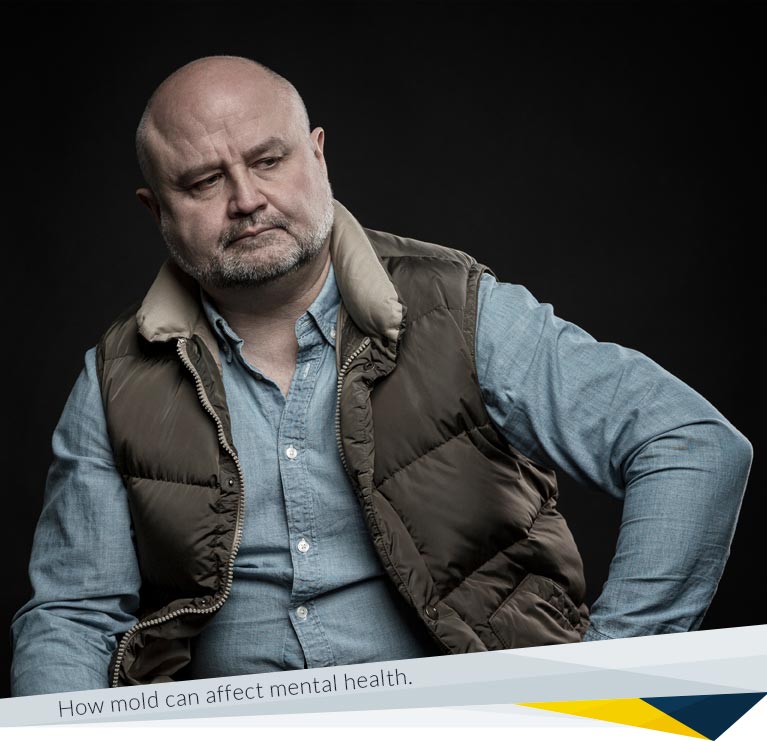
Exposure to mold can trigger a number of adverse health effects. Some types of fungi produce compounds called mycotoxins. These toxins may have negative health effects on people that are susceptible.
According to the National Institute of Environmental Health Sciences, mold exposure can trigger a flare-up of asthma or allergy symptoms, leading to trouble breathing.
While the respiratory symptoms from mold exposure are well known, some people may also develop mental health or emotional problems. The article below takes a look at mold and its relation to depression and anxiety.
Mold exposure may trigger a host of physical and mental health issues. For example, exposure to mold may cause anxiety and depression symptoms.
Mold exposure may lead to depression and mold anxiety for a few reasons. For example, mold toxins may gain access to the brain directly through the nasal pathways. When you inhale mold spores, it may directly affect the brain chemistry leading to symptoms of anxiety and/or depression. Some people are more vulnerable to mold toxins and have difficulties clearing the biotoxins from their bodies.
Symptoms of depression and anxiety may also develop due to an inflammatory response that leads to the release of cytokines. This release can trigger physical and cognitive issues.
For instance, according to research in the journal Brain Behavior Immunology, mold can cause depression due to the immune response that occurs after exposure to the toxins in mold.
Psychology Today indicated that about 25% of the population is vulnerable to mold toxicity, which can lead to psychiatric symptoms such as depression and anxiety.



The symptoms of mold exposure-related anxiety and depression can vary widely. Not every case is the same. Everyone has their own unique experience with mold and depression or anxiety.
Usually, anxiety and depression related to mold exposure involve the same symptoms as other causes of depression and anxiety. In general, typical symptoms related to mold and anxiety and depression include:
Most of the research on the long-term effects of mold relates to respiratory issues and allergies. In those instances, the longer someone has mold exposure, the more intense their symptoms may become.
It makes sense that the same thing holds true for mold exposure and mental health issues. Long-term exposure may continue to make depression and anxiety worse. Worsening symptoms of depression can have an impact on all areas of a person's life.
Additionally, the long-term effects of mold may also cause brain fog, difficulty concentrating, and fatigue. These symptoms also make it more difficult to get a handle on mental health issues.
Preventing mold exposure in our homes and workplaces is the best way to reduce the risk of mental health issues from mold toxins. Although mold grows outside, we usually cannot control outdoor mold. But we can take steps to control indoor mold.
According to the Centers for Disease Control and Prevention, some steps to take to prevent mold exposure in our homes and workplaces includes the following:
Consult a professional mold service, such as FDP Mold Remediation, to tackle mold removal in a professional and safe way.
If you or a loved one has depression and you suspect it is due to mold, consult your doctor. Your healthcare provider will assess your symptoms and recommend appropriate treatment.
Treatment may depend on a variety of factors, such as underlying health issues, age, and the severity of symptoms. Treatment may include:
Mold treatment involves removing the mold safely and efficiently. Trying to remove the mold yourself may lead to even greater mold exposure and, subsequently more symptoms. In addition, you may not get rid of all the mold. At FDP Mold Remediation, we are a professional mold removal service that safely and professionally removes mold.
Recent research on mold exposure and mental health issues found a link between mold and depression and anxiety.
A large study in the American Journal of Public Health involved 5,882 adults from 2,982 households. Researchers analyzed data to determine if exposure to mold played a role in brain function, specifically how it related to depression and anxiety.
The study found that certain toxins in the mold may affect the nervous system. The exact effect on the nervous system may vary by individual.
But researchers found that the frontal cortex may become affected by the toxins. The frontal cortex plays a role in problems solving, socialization, and memory. When this part of the brain is damaged by the toxins in the mold spores, it can affect your mood and may lead to mental health issues.
The study indicated who people that lived in homes with mold had an increased risk of depression. Even after accounting for other factors, people that lived in a home with mold were 34% to 44% more likely to have depression than people who did not live in a home with mold.
Dealing with indoor mold is essential for your well-being. Mold exposure can lead to various health effects, including depression and anxiety. Getting rid of the mold as soon as possible may prevent long-term negative health effects.
Don't let mold compromise your health or the integrity of your property. Contact our professional mold removal services in Washington, DC, Arlington, VA, Annapolis, MD, Miami, FL, Dallas, TX, or Elizabeth, NJ today. We'll work diligently to rid your space of mold and restore it to a safe and healthy condition. Trust us to provide reliable and effective mold remediation solutions tailored to your specific needs.
We are an IICRC-certified mold remediation service and are ready to answer your questions. Feel free to call us at 877-421-2614 for a consultation.

